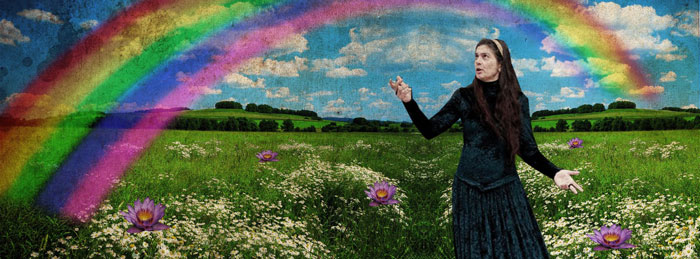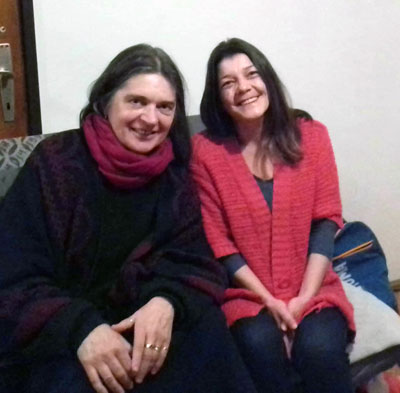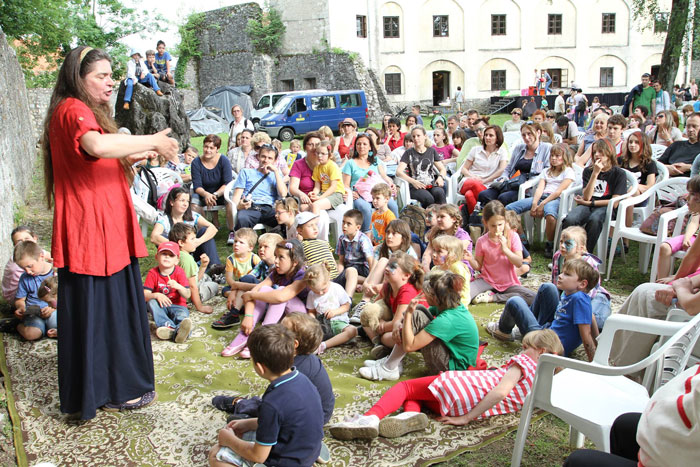Jasna in the homeland of fairy tales

Ten years ago I was already acquainted with the fairy tale storyteller Jasna Held, thanks to the Ogulin Fairy Tales Festival, but I had no idea that we would meet and that the meeting would change my life.
I always say, and I will always say when I mention Jasna, that she taught me how to speak.
Of course I knew how to speak, but what she taught me was to speak loud and clear, and when I mastered that first lesson I noticed that I was heard, unlike before.
Apart from the speaking exercises, storytelling techniques, the atmosphere of speech, the dealing with nerves before a public performance, the choice of costume and fairy tales or stories which match these mental images, Jasna, i.e. the time spent with her, gave my life a new dimension, which had lived within me and at the right moment came to realisation. With Jasna’s help I became a storyteller of fairy tales and stories for young and old.
Jasna Held is our first professional narrator of fairy tales and stories. She has worked in this vocation for many years and has paved the way in Croatia in this unique profession, to anyone who wants to listen or start working in this field. She shares her knowledge and skills selflessly. Behind her and, we hope, ahead of her, is a series of storytelling workshops, and many more performances, both in Croatia and abroad. She is an ambassador of Croatian folk tales around the world. She recently visited Ogulin, which she calls “her second home”, and so we took this opportunity for a short interview for you.

Welcome to Ogulin Jasna. How do you feel in this homeland which is different from your Dubrovnik, where you come from, knowing that you bring us fairy tales and knowledge about fairy tales and in that way you enrich Ogulin as the home of fairy tales.
- I once read somewhere, I can’t remember who said it, “wherever I’m going, I’m coming home”, and that is also how I feel. After all, where your friends are, that is also your home.
You have been storytelling for many years. You have your own faithful audience, young and old. You perform throughout the country and further afield. Was it difficult at the very beginning and in what moment did you realise that storytelling and the performing arts were your true calling?
- The question is “what is difficult”? When someone wants something, they feel strive for it, everything that they encounter on this path – they resolve – and do not experience it as difficult, regardless of how others see it. It is the same as in fairy tales and in fact in life. The only difference is in our view – do we want to see something as an obstacle and a challenge that we need to resolve or as a problem which suppresses us? And when I realised that this was my life’s calling…. Eh! (that’s what my grandmother would say when they would ask her about something from her youth…) that is a long story, long because it is also about a cognitive path…
In your repertoire there are hundreds of fairy tales. You are a kind of fairy tale database. Someone once asked you how many fairy tales you narrate, you replied that you stopped counting after 250. Which of them has been accepted by the audience the best?
- It all depends on the audience, where we are, which time of year (oh, yes, even that!) and if I have established a good vibe with the audience. And that’s not all…
It is well-known that narration, apart from stimulating the imagination, also has a therapeutic effect. Please remind us Jasna, why is oral transmission important and what does it bring us, and what does it “take away”?
- A living human voice (this formulation technically sounds strange but in today’s time people consider oral narration as electronically recorded or virtual… unfortunately) that narrates folk tales and stories is a valuable media which nothing else cannot replace! Folk tales and stories are transmitted amongst the people exclusively in an oral way. I will place the answer in a question: “It is sufficient to ask ourselves – how is it possible that the same fairy tales that people have listened to for not only centuries but for thousands of years, are still valid to this today?” I will only say that with a dictionary of fairy tales: “bring us light and take away the darkness…”
In your opinion, what is the current situation with the storytelling arts in Croatia? What can and what should be done, what could be improved?
- There are already storytellers who are making an effort in storytelling. And there is always something to work on and improve, it is individual, I can say for myself that I always listen to myself (I listen as I narrate and later I think, or “analyse”, about it ) and I consider those moments which I need to work on, which I could do better next time.
You once said that “storytelling is the expression of simple things in an unusual way”, can you explain this to us a little?
- With folk tales the atmosphere and the ambience are important. We will not express magical, wonderful events, in an identical way as some kind of description or some “normal” things. As the answer to this question concerns speech, it is impossible to explain it in written words, it can only be done well with the spoken word, because it is only when you hear that you can understand, especially about the question of “atmosphere” which is crucial!
Do you think that storytelling has a place in kindergartens and schools? Apart from that also in old people’s homes, hospitals? What are your experiences?
- Storytelling is a place where there are those who want to listen. There is no limit!
We hear a lot about how technology today is taking over and how children have less and less patience to develop the skill of speaking. However, when we tell them stories, we see that they can spend time without their mobile phones, in fact, they even enjoy it and “go with it”. This means that if we address them loudly and clearly and dedicate time to them telling stories (or simply talking) – they gladly accept it. Do we then need to narrate to children more often?
- In the defence of children I must say that they are not children who “have increasingly less patience to develop their speaking skills” but adults who have increasingly less patience to help children to develop those speaking skills. It is a problem of communication which for the majority of parents amounts to “good morning”, “how was it in school?” and “go and tidy your room”, yet they are confident that they have no problem with communicating with their children. What is extremely valuable is to tell children a folk tale and it is not only for speech. Folk tales are necessary for children, children are important, they need them. Whatever some may say against fairy tales, they don’t know what they’re saying. Or as one character from a fairy tale would say: “Eh, if they did know… But they don’t know!”

And the final question, when and where is your next performance? You are a regular face at the Ogulin Fairy Tale Festival, what are you preparing for us this year?
- My next performance will be in Zagreb and what am I preparing for Ogulin? Well, come and you will hear!
Jasna Held on www: http://bajke.net/ and Facebook
Translation by Martin Mayhew